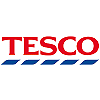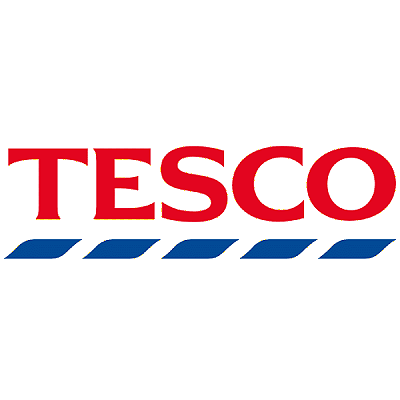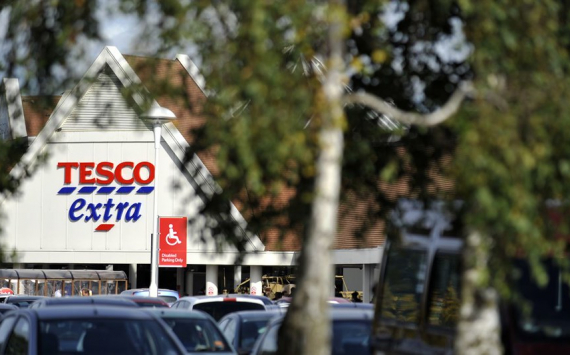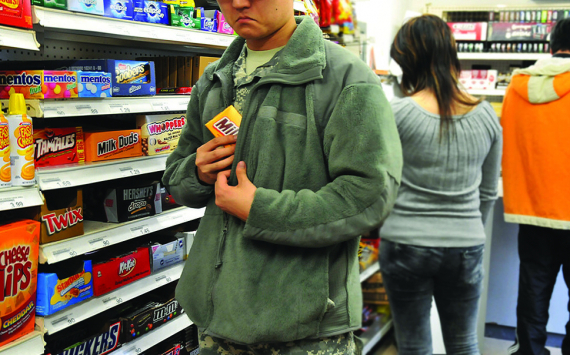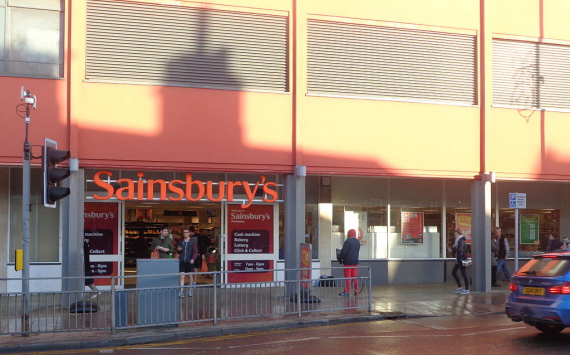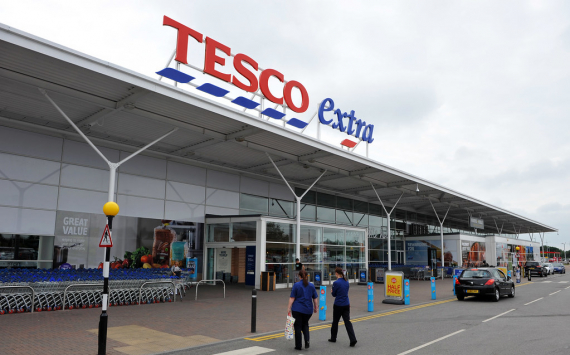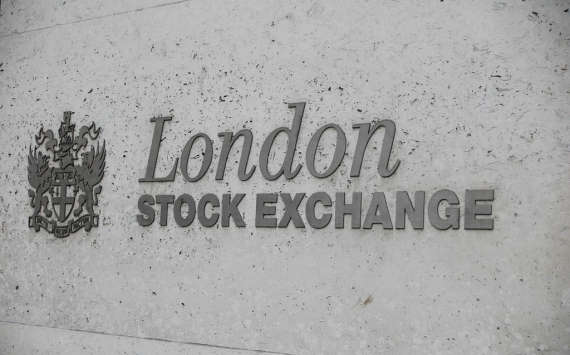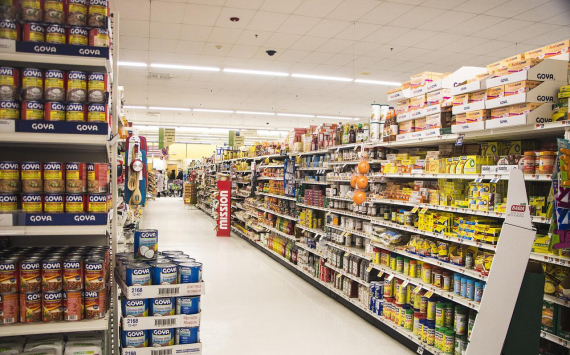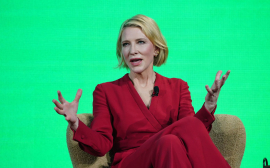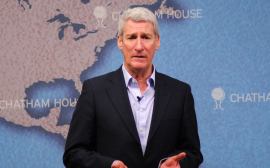Description
Tesco plc (/ˈtɛs.koʊ/) is a British multinational groceries and general merchandise retailer headquartered in Welwyn Garden City, England. It is the third-largest retailer in the world measured by gross revenues and the ninth-largest in the world measured by revenues. It has shops in five countries across Europe, and is the market leader of groceries in the UK (where it has a market share of around 28.4%).
Tesco was founded in 1919 by Jack Cohen as a group of market stalls in Hackney, London. The Tesco name first appeared in 1924, after Cohen purchased a shipment of tea from T. E. Stockwell and combined those three initials with the first two letters of his surname, and the first Tesco shop opened in 1931 in Burnt Oak, Barnet. His business expanded rapidly, and by 1939 he had over 100 Tesco shops across the country.
Tesco has expanded globally since the early 1990s, with operations in 11 other countries in the world. The company pulled out of the US in 2013, but as of 2018 continues to see growth elsewhere. Since the 1960s, Tesco has diversified into areas such as the retailing of books, clothing, electronics, furniture, toys, petrol, software, financial services, telecoms and internet services. In the 1990s Tesco repositioned itself from being a downmarket high-volume low-cost retailer, attempting to attract a range of social groups with its low-cost "Tesco Value" range (launched 1993) and premium "Tesco Finest" range.
Tesco is listed on the London Stock Exchange and is a constituent of the FTSE 100 Index. It had a market capitalisation of approximately £18.1 billion as of 22 April 2015, the 28th-largest of any company with a primary listing on the London Stock Exchange.
History
Origins
Jack Cohen, the son of Jewish migrants from Poland, founded Tesco in 1919 when he began to sell war-surplus groceries from a stall at Well Street Market, Hackney, in the East End of London. The Tesco brand first appeared in 1924. The name came about after Jack Cohen bought a shipment of tea from Thomas Edward Stockwell. He made new labels using the initials of the supplier's name (TES), and the first two letters of his surname (CO), forming the word TESCO. After experimenting with his first permanent indoor market stall at Tooting in November 1930, Jack Cohen opened the first Tesco shop in September 1931 at 54 Watling Street, Burnt Oak, Edgware, Middlesex. Tesco was floated on the London Stock Exchange in 1947 as Tesco Stores (Holdings) Limited. The first self-service shop opened in St Albans in 1956 (which remained operational until 2010 before relocating to larger premises on the same street, with a period as a Tesco Metro), and the first supermarket in Maldon in 1956. In 1961 Tesco Leicester made an appearance in the Guinness Book of Records as the largest shop in Europe.
Expansion
During the 1950s and 1960s, Tesco grew organically, and also through acquisitions, until it owned more than 800 shops. The company purchased 70 Williamson's shops (1957), 200 Harrow Stores outlets (1959), 212 Irwins shops (1960), 97 Charles Phillips shops (1964) and the Victor Value chain (1968) (sold to Bejam in 1986).
Jack Cohen's business motto was "pile it high and sell it cheap", to which he added an internal motto of "YCDBSOYA" (You Can't Do Business Sitting On Your Arse) which he used to motivate his sales force.
In May 1987, Tesco completed its hostile takeover of the Hillards chain of 40 supermarkets in the North of England for £220 million.
In 1994, the company took over the supermarket chain William Low after fighting off Sainsbury's for control of the Dundee-based firm, which operated 57 shops. This paved the way for Tesco to expand its presence in Scotland, in which its presence was weaker than in England.
Tesco introduced a loyalty card, branded 'Clubcard' in 1995, and later an Internet shopping service. In 1996 the typeface of the logo was changed to the current version with stripe reflections underneath, whilst the corporate font used for shop signage was changed from the familiar "typewriter" font that had been used since the 1970s. Overseas operations were introduced the same year. Terry Leahy assumed the role of Chief Executive on 21 February 1997, the appointment having been announced on 21 November 1995.
On 21 March 1997, Tesco announced the purchase of the retail arm of Associated British Foods, which consisted of the Quinnsworth, Stewarts and Crazy Prices chains in Ireland and Northern Ireland, and associated businesses, for £640 million. The deal was approved by the European Commission on 6 May 1997.
The company was the subject of a letter bomb campaign lasting five months from August 2000 to February 2001 as a bomber calling himself "Sally" sent letter bombs to Tesco customers and demanded that Clubcards be modified to be capable of withdrawing money from cash machines.
Diversification
The first self-service Tesco shop in St Albans, Hertfordshire. The shop has since relocated.
The company started to expand the range of products it sold during the 1960s to include household goods and clothing under the Delamare brand, and in 1974 opened its first petrol station.
In July 2001, Tesco became involved in internet grocery retailing in the US when it obtained a 35% stake in GroceryWorks. In 2002, Tesco purchased 13 HIT hypermarkets in Poland. It also made a major move into the UK's convenience shop market with its purchase of T & S Stores, owner of 870 convenience shops in the One Stop, Dillons and Day & Nite chains in the UK.
In June 2003, Tesco purchased the C Two-Network in Japan.[34] It also acquired a majority stake in the Turkish supermarket chain Kipa. In January 2004, Tesco acquired Adminstore, owner of 45 Cullens, Europa, and Harts convenience shops, in and around London.
In Thailand, Tesco Lotus was a joint venture of the Charoen Pokphand Group and Tesco, but facing criticism over the growth of hypermarkets CP Group sold its Tesco Lotus shares in 2003. In late 2005 Tesco acquired the 21 remaining Safeway/BP shops after Morrisons dissolved the Safeway/BP partnership. In mid-2006 Tesco purchased an 80% stake in Casino's Leader Price supermarkets in Poland, which were then rebranded as small Tesco shops.
On 9 February 2006, Tesco announced plans to move into the United States by opening a chain of small format groceries in the Western states (Arizona, California, and Nevada) in 2007 named Fresh & Easy.
2010s
In 2010, Tesco started funding a small film studio intended to produce Tesco exclusive direct-to-DVD films. The first film was released on 6 September called Paris Connections, based on a popular novel by Jackie Collins.
Tesco confirmed in April 2013 that it was pulling out of the US market (Fresh & Easy Stores), at a reported cost of £1.2 billion. In September 2013, Tesco announced that it would sell the business to Ronald Burkle's Yucaipa Companies for an undisclosed amount. That same month, Tesco launched its first tablet computer, a seven-inch model called Hudl. Also in 2013, Tesco purchased the restaurant and cafe chain Giraffe for £48.6 million.
On 1 September 2014, Dave Lewis, previously of Unilever, took over as CEO. In January 2015, Lewis announced plans to close the company's head office in Cheshunt and 43 loss-making shops in the near future, and the cancellation of 49 new large supermarket developments. The shop closures were expected to make 2,000 staff redundant, while a further £250 million of cost-cutting measures were planned.
In January 2015, Tesco confirmed the sale of its Blinkbox on-demand video service and its fixed-line telephone and broadband business to TalkTalk. On 26 January 2015, Tesco sold the Blinkbox Music streaming service to Guvera, and confirmed it would close its Blinkbox Books service by the end of February 2015.
In April 2016, Tesco confirmed the sale of 8.6% of its holding in Lazada Group, leaving it with an 8.3% stake. It was also reported to be seeking to sell Dobbies Garden Centres, Giraffe Restaurants and Harris + Hoole to concentrate on its main supermarket business.
On 27 January 2017, it was announced that Tesco had reached an agreement to merge with Britain's biggest wholesaler Booker Group to create the UK's largest food group, there are however concerns over market dominance with Tesco being Britain's largest food retailer and Booker being the UK's largest wholesaler. It was announced in March 2017 that Trevor Masters, International Chief Executive, would be leaving in May after 38 years with the company. On 1 April, Tony Hoggett became Tesco's CEO for Asia, and Matt Simister became CEO for Central Europe. Also in April 2017, the company confirmed it would sell its in-shop opticians' business to Vision Express. In June 2017, Tesco announced a major cost-cutting initiative that would reduce the company's workforce by over 1,200 workers. Key reductions included over a quarter of its employees in Welwyn Garden City and Hatfield, and the closure of the call centre in Cardiff. The company hoped to reduce costs by £1.5 billion.
In January 2019, Tesco announced another cost-cutting initiative that would close the food counters in 90 stores, affecting around 9,000 workers. In October 2019, Tesco announced that CEO Dave Lewis would step down in 2020, and would be succeeded by Ken Murphy.
In December 2020, Tesco put purchasing limits on some products (up to three items), such as eggs, rice, soap, and toilet papers, in order to give everyone access to the products.
UK operations
Tesco
Hypermarkets
Tesco Extra shops are larger, mainly out-of-town hypermarkets that stock nearly all of Tesco's product ranges, although some are in the heart of town centres and inner-city locations. The largest shop in England by floor space is Tesco Extra in Walkden, with 17,230 square metres (185,500 sq ft) of floorspace.
In common with other towns, such as Warrington, St Helens shop, which at 13,000 m2 (140,000 sq ft) is one of the biggest in England, was developed on the same site as the town's new rugby league stadium.
Supermarkets
Tesco Superstores are standard large supermarkets, stocking groceries and a much smaller range of non-food goods than Extra hypermarkets. The shops have always been branded as 'Tesco', but a new shop in Liverpool was the first to use the format brand 'Tesco Superstore' above the door.
Tesco operates a number of in-shop cafes, but also began to introduce new restaurants in its shops from 2013 under the "Decks Carvery" brand.
Tesco Metro
Tesco Metro shops are sized between Tesco superstores and Tesco Express shops, with shops averaging 1,000 square metres (11,000 sq ft). They are mainly located in town centres and similar urban locations and were designed to accommodate larger weekly shops as well as top-up shopping.
In May 2021, Tesco announced the brand would be retired as only 31% of customers were using the stores for larger shops. 89 locations will convert to the Tesco Express format while the remining 58 will adopt the standard superstore format.
Tesco Express
Tesco Express shops are neighbourhood convenience shops averaging 200 square metres (2,200 sq ft), stocking mainly food with an emphasis on higher-margin products such as sweets, crisps, chocolate, biscuits, fizzy drinks and processed food (due to small shop size, and the necessity to maximise revenue per square foot) alongside everyday essentials. They are located in busy city-centre districts, small shopping precincts in residential areas, small towns and villages, and on Esso petrol station forecourts. In 2010 it became known that Tesco was operating Express pricing, charging more in its Express branches than in its other stores. A spokesperson said that this was "because of the difference in costs of running the smaller shops".
Fuel stations
Tesco first started selling petrol in 1974. Tesco sells 95, 97 and 99 RON (a fuel developed by Greenergy of which Tesco is a shareholder) petrol from forecourts at most Superstore and Extra locations. Tesco recently diversified into biofuels, offering petrol-bioethanol and diesel-biodiesel blends instead of pure petrol and diesel at its petrol stations, and now offering Greenergy 100% biodiesel at many shops in the southeast of the United Kingdom. In 1998, Tesco and Esso (part of ExxonMobil) formed a business alliance that included several petrol filling stations on lease from Esso, with Tesco operating the attached shops under its Express format. In turn, Esso operates the forecourts and sells fuel via the Tesco shop. As of 2013, there were 200 joint Tesco Express/Esso sites in the UK.
Online
In the United Kingdom Tesco operates a home shopping service through the Tesco.com website. In May 1984, in Gateshead, England, Mrs. Jane Snowball used a piece of computer technology called "Videotex" on her television to purchase groceries from her local Tesco shop in the world's first recorded online shopping transaction from the home. As of November 2006, Tesco was the only food retailer to make online shopping profitable. Since 2006 Tesco has operated a number of dark stores dedicated to the fulfilment of online orders of groceries:
Loyalty card
Tesco launched its customer loyalty scheme, the Tesco Clubcard, in 1995. It has been cited as a pivotal development in Tesco's progress towards becoming the UK's largest supermarket chain and one that fundamentally changed the country's supermarket business. Tesco itself was cited in a Wall Street Journal article as using the intelligence from the Clubcard to thwart Wal-Mart's initiatives in the UK.
Cardholders can collect one Clubcard point for every £1 (or one point for €1 in Ireland and Slovakia or 1 point for 1zł in Poland) they spend in a Tesco shop, or at Tesco.com, and 1 point per £2 on fuel (not in Slovakia). Customers can also collect points by paying with a Tesco Credit Card, or by using Tesco Mobile, Tesco Homephone, Tesco Broadband, selected Tesco Personal Finance products or through Clubcard partners, E.ON and Avis. Each point equates to 1p in shops when redeemed, or up to four times that value when used with Clubcard deals (offers for holidays, day trips, etc.) Clubcard points (UK & IE) can also be converted to Avios and Virgin Atlantic frequent flyer miles.
One Stop
One Stop, which includes some of the smallest shops (smaller than a Tesco Express), was (until 2018, when the first Jack's store opened) the only Tesco shop format in the UK that did not include the word Tesco in its name. The brand, along with the original shops, formed part of the T&S Stores business but, unlike many that were converted to Tesco Express, these kept their old name. Subsequently, other shops bought by Tesco have been converted to the One Stop brand. Some have Tesco Personal Finance branded cash machines. The business has attracted some controversy, as the prices of groceries in these shops, often situated in more impoverished areas, can be higher than nearby Tesco branded shops, highlighted in The Times 22 March 2010: "Britain's biggest supermarket uses its chain of 639 One Stop convenience shops–which many customers do not realise it owns–to charge up to 14 per cent more for goods than it does in Tesco-branded shops."
Tesco responded to the article stating "It is a separate business within the Tesco Group, with its own supply chain and distribution network. One Stop shops offer a different range to Express shops and its operating costs are different. One Stop's price strategy is to match to its nearest competitor, Costcutter, and is frequently cheaper."
Jack's
In 2018, Tesco launched a separate budget chain, Jack's, to compete with Lidl and Aldi; the first store opened in Chatteris, Cambridgeshire in September 2018.
Subsidiaries
Booker Group
Tesco completed its acquisition of the food wholesaler Booker in March 2018. Booker also owns the Budgens, Londis, Euro Shopper and Premier Stores brands which operate under franchises.
Tesco Bank
In the United Kingdom Tesco offers financial services through Tesco Bank, formerly a 50:50 joint venture with The Royal Bank of Scotland. Products on offer include credit cards, loans, mortgages, savings accounts and several types of insurance, including car, home, life and travel. They are promoted by leaflets in Tesco's shops and through its website. The business made a profit of £130 million for the 52 weeks to 24 February 2007, of which Tesco's share was £66 million. This move towards the financial sector diversified the Tesco brand and provides opportunities for growth outside of the retailing sector. On 28 July 2008, Tesco announced that it would buy out the Royal Bank of Scotland's 50% stake in the company for £950 million.
F&F
F&F launched in 2001 as Florence & Fred in Tesco’s UK and Ireland supermarkets. In 2010, the brand started to open stores in of itself starting with a London store. In the early to mid-2010s, it expanded to multiple countries stores and online.
In the UK, F&F had its own website until 2016 when it was folded into Tesco Direct - which itself folded in August 2018. After this, F&F had no online UK presence until it partnered with Next PLC. Tesco launched a scaled down F&F on Tesco.com soon after its deal with Next.
Tesco Mobile
Tesco operates a mobile phone business across the United Kingdom, Ireland, Slovakia, Hungary and the Czech Republic. It first launched in the UK in 2003 as a joint venture with O2 and operates as a mobile virtual network operator (MVNO) using the network of O2 with the exceptions of Hungary where the network of Vodafone Hungary is used and Ireland where Three Ireland. As a virtual operator, Tesco Mobile does not own or operate its own network infrastructure. By January 2011 Tesco announced it had over 2.5 million UK mobile customers.
Tesco also operated a home telephone and broadband business. Its broadband service launched in August 2004 to complement its existing internet service provider business, providing an ADSL-based service delivered via BT phone lines. In January 2015, Tesco sold its home telephone and broadband business, together with Blinkbox, to TalkTalk for around £5 million. Its customers were transferred by 2016.
Tesco Tech Support
Tesco acquired a small I.T. support company called The PC Guys in 2007, and were able to launch Tesco Tech Support in December 2008.
Former operations
Tesco Home 'n' Wear
In the 1960s, Tesco set up a non-food division, Tesco Home 'n' Wear, headed by Leslie Porter. It had stand-alone shops and departments in larger shops, and from 1975 a distribution centre in Milton Keynes. Although Tesco continued to stock non-food items the stand-alone shops were closed and the name was no longer in use when Tesco Extra was launched.
Tesco Homeplus
In May 2005, Tesco announced a trial non-food only format near Manchester and Aberdeen and the first shop opened in October 2005. The shops offered all of Tesco's ranges except food in warehouse-style units in retail parks. Tesco introduced the format as only 20% of its customers had access to a Tesco Extra, and the company was restricted in how many of its superstores it could convert into Extras and how quickly it could do so. Large units for non-food retailing are much more readily available. The format was not Tesco's first non-food only venture in the UK. Until the late 1990s/early 2000s there were several non-food Tesco shops around the country including Scarborough and Yate. Although not in a warehouse-style format, the shops were located on high streets and shopping centres, and stocked similar items to Homeplus shops. In both cases this was because another part of the shopping centre had a Tesco Superstore that stocked food items only. By 2014, the number of Homeplus shops in the United Kingdom had reached 12; the newest shop opened in Chester in July 2009. In 2012 it was reported that Tesco was looking to close the business to focus on groceries. Tesco closed six Homeplus shops on 15 March 2015, and the remaining six shops closed on 27 June 2015.
Dobbies Garden Centres
Dobbies is a chain of garden centres across Scotland, England and Northern Ireland. Tesco completed its acquisition of Dobbies in 2008, and the company continued to trade under its own brand, from its own head office in Melville, near Edinburgh. On 17 June 2016, Tesco sold the company on to a group of investors led by Midlothian Capital Partners and Hattington Capital for £217 million.
Harris + Hoole
In 2012, Tesco invested in a new coffee shop chain, named Harris + Hoole after coffee-loving characters in Samuel Pepys' diary. Tesco took full ownership of the business from its founders Nick, Andrew and Laura Tolley in February 2016, and agreed in June 2016 to sell it to Caffè Nero.
Giraffe
Giraffe is a restaurant chain in the United Kingdom which Tesco purchased in March 2013 as part of a strategy of making use of excess space in its shops. Tesco sold the chain to Boparan Holdings in June 2016.
Euphorium Bakery
Euphorium Bakery opened a concession in Tesco's Kensington shop in 2012, and in 2013 Tesco bought a stake in the business. It purchased the remaining stake in April 2015. In August 2016, Tesco sold Euphorium's high street shops and factory in Islington to Soho Coffee, and its factory in Weybridge to Samworth Brothers.
International operations
Tesco has expanded its operations outside the UK to 11 other countries in the world. The company pulled out of the US in 2013, but as of 2018 continues to see growth elsewhere. Tesco's international expansion strategy has responded to the need to be sensitive to local expectations in other countries by entering into joint ventures with local partners, such as with Charoen Pokphand in Thailand to form Tesco Lotus, and by appointing a very high proportion of local personnel to management positions. It also makes small acquisitions as part of its strategy: for example, in its 2005/2006 financial year it made acquisitions in South Korea; one in Dubai, UAE; one in Poland; and one in Japan.7 On 7 September 2015, Tesco sold its South Korean business, Homeplus, to MBK Partners and partnered with a Canadian pension fund and Temasek Holdings for the deal.
Ireland
Tesco Ireland is the company's subsidiary in the Republic of Ireland where its main competitors in Ireland are Dunnes Stores and SuperValu.
Corporate affairs
Corporate strategy
According to Citigroup retail analyst David McCarthy, "[Tesco has] pulled off a trick that I'm not aware of any other retailer achieving. That is to appeal to all segments of the market". One plank of this strategy has been Tesco's use of its own-brand products, including the upmarket "Finest", mid-range Tesco brand and low-price "Value" encompassing several product categories such as food, beverage, home, clothing, Tesco Mobile and financial services.
Beginning in 1997 when Terry Leahy took over as CEO, Tesco began marketing itself using the phrase "The Tesco Way" to describe the company's core purposes, values, principles, and goals This phrase became the standard marketing speak for Tesco as it expanded domestically and internationally under Leahy's leadership, implying a shift by the company to focus on people, both customers and employees.
A core part of the Tesco expansion strategy has been its innovative use of technology. It was one of the first to build self-service tills and use cameras to reduce queues, and an early adopter of In 2016, Tesco developed a mobile payment wallet, PayQwiq using both NFC contactless and barcode technology to allow payment using mobile phones in-shop (along with supporting other contactless mobile wallets such as ApplePay).
Advertising
A notable 1980s advert was "Checkout 82," which was made in 1982, where a till would have a receipt coming out of it with the prices on. This advert had synthpop music as the backing and people singing "Check it out, check it out".
Adverts in the early 1990s had a man called David, portrayed by Dudley Moore, on the hunt for free-range chickens from France and discovering many goods from around the world to purchase for Tesco. Late 2000s adverts included many celebrities and celebrity voice-overs such as The Spice Girls and the voice of actors James Nesbitt and Jane Horrocks.
Tesco's main advertising slogan is "Every little helps". Its advertisements in print and on television mainly consist of product shots (or an appropriate image, such as a car when advertising petrol) against a white background, with a price or appropriate text (e.g., "Tesco Value") superimposed on a red circle.
Tesco's in-shop magazine is one of the largest-circulation magazines in the United Kingdom, with a circulation of 1.9 million as of 2013[update].
In November 2013, Tesco announced it would introduce face-scanning technology developed by Amscreen at all of its 450 UK petrol stations to target advertisements to individual customers.
Criticism
Criticism of Tesco includes allegations of stifling competition due to its undeveloped "land bank", and breaching planning laws.
Litigation
The Tesco supermarket chain is involved in litigation such as the Ward v Tesco Stores Ltd and Tesco Supermarkets Ltd v Nattrass cases. Tesco have been criticised for aggressively pursuing critics of the company in Thailand. Writer and former MP Jit Siratranont faced up to two years in jail and a £16.4 million libel damages claim for saying that Tesco was expanding aggressively at the expense of small local retailers. Tesco served him with writs for criminal defamation and civil libel. The Thai court dismissed the case, ruling that the criticism made by the defendant was 'in good faith by way of fair comment on any person or thing subjected to public criticism'.
In November 2007, Tesco sued a Thai academic and a former minister for civil libel and criminal defamation, insisting that the two pay £1.6 million and £16.4 million and receive two years' imprisonment respectively. They have been alleged to have misstated that Tesco's Thai market amounts to 37% of its global revenues, amongst criticism of Tesco's propensity to put small retailers out of business.
In August 2013, Tesco was fined £300,000 after admitting that it misled customers over the pricing of "half price" strawberries.
Use of caged eggs
In May 2019 an undercover investigation of an Asian Tesco egg supplier, released by the Daily Mirror, found Tesco is serving Asian customers eggs from battery cage. In August 2019, an investigation of the company producing Tesco's own-brand eggs in Malaysia, broken by the New Straits Times, documented similar conditions. In response to the investigation, Tesco committed to using only cage-free eggs in Thailand and Malaysia.
Price-fixing
In 2007, Tesco was placed under investigation by the UK Office of Fair Trading (OFT) for acting as part of a cartel of five supermarkets (Safeway, Tesco, Asda, Morrisons and Sainsburys) and a number of dairy companies to fix the price of milk, butter and cheese. In December 2007, Asda, Sainsburys and the former Safeway admitted that they acted covertly against the interests of consumers while publicly claiming that they were supporting 5,000 farmers recovering from the foot-and-mouth. They were fined a total of £116 million.
Corporate tax structure
In May 2007, it was reported that Tesco had moved the head office of its online operations to Switzerland. This allows it to sell CDs, DVDs and electronic games through its web site without charging value-added tax (VAT). The operation had previously been run from Jersey, but had been closed by authorities who feared damage to the island's reputation.
In June 2008, the government announced that it was closing a tax loophole being used by Tesco. The scheme, identified by British magazine Private Eye, utilised offshore holding companies in Luxembourg and partnership agreements to reduce corporation tax liability by up to £50 million a year. Another scheme previously identified by Private Eye involved depositing £1 billion in a Swiss partnership, and then loaning that money to overseas Tesco shops, so that profit could be transferred indirectly through interest payments. This scheme was still in operation in June 2008 and was estimated to be costing the UK exchequer up to £20 million a year in corporation tax. Tax expert Richard Murphy has provided an analysis of this avoidance structure.
Tax avoidance has not always related to corporation tax. A number of companies including Tesco used a scheme to avoid VAT by deeming 2.5% of purchases paid for by card to be a 'card transaction fee', which reduced the company's tax liability without changing the charge to the customer. Such schemes came to light after HMRC litigated against Debenhams over the scheme in 2005.
Opposition to expansion
Tesco's expansion has been criticised, and in some cases actively opposed.
Plans for a large Tesco shop in St Albans, Hertfordshire, attracted widespread local opposition. This led to the formation of the "Stop St Albans Tesco Group". In June 2008, St Albans Council refused planning permission for the proposed new shop.
In April 2011, longstanding opposition to a Tesco Express shop in Cheltenham Road, Stokes Croft, Bristol, evolved into a violent clash between opponents and police. The recently opened shopfront was heavily damaged, and police reported the seizure of petrol bombs. Opponents have suggested that the shop would damage small shops and harm the character of the area.
In March 2015 an arson attack gutted a new Tesco Express shop in Godalming, Surrey, two days before it was due to open. Tesco had purchased a public house and converted it to the new store, a change which did not require planning permission, thus denying the vigorous local opposition any formal means of preventing it. After continuing local opposition, including the local MP and borough council, Tesco abandoned its plans for the shop in January 2017.
Horse meat found in burgers
In January 2013, the British media reported that horse meat had been found in some meat products sold by Tesco, along with other retailers, particularly burgers. Prime Minister David Cameron called this "unacceptable", with products showing 29.1% horse meat in the "Value" range burger, which were supposed to be beef. Tesco withdrew 26 of its products in response, and announced that it was working with authorities and the supplier to investigate the cause of the contamination.
Discrimination against the blind
In July 2013, Tesco security staff violated the UK Equality Act 2010 by refusing to allow a blind lady's guide dog to enter the Feltham shop. Tesco staff refused to apologise for the violation of the law for 5 days. It was also reported that security staff had thrice previously ordered a different blind person and his guide dog to leave the shop. Following a further incident in 2013 when the manager of Tesco in Sutton ordered a blind person and her guide dog to leave the shop, Tesco stated that its staff had received training to ensure that such an incident would not happen again. In 2014 Tesco staff shouted at a customer with a guide dog and told her not to return to the store. Tesco later said "This clearly should never have happened and we will contact Ms Makri directly to apologise. We do allow guide dogs in stores and have reminded colleagues of that" and donated £5,000 to a guide dogs charity.
Slavery in Thailand
In 2014, The Guardian reported that Tesco is a client of Charoen Pokphand Foods. Over 6 months The Guardian traced the whole chain from slave ships in Asian waters to leading producers and retailers.
Sale of goods from Israel
Tesco has been targeted by protesters complaining the supermarket chain sells goods made in Israel, with most complaints being about products emanating from Israeli settlements in the West Bank. Protests generally occur when Israeli military operations are being carried out in the Gaza Strip or the West Bank. A protester was arrested at a protest at a shop in Birmingham on 16 August 2014.
Sale of anti-semitic books
In 2005, Searchlight magazine said it was "horrified" to discover anti-semitic books by US extremist publisher Liberty Bell on the Tesco website. Titles offered for sale included The Hitler We Loved and Why", The International Jew and The Protocols of the Elders of Zion. Searchlight found another 106 titles by British-based publisher Steven Books which it describes as "so extreme that even the British National Party does not sell them". The shop said in a statement: "Tesco.com has over one million book titles covering a wide range of subjects. We are unhappy that titles which could cause offence to some customers have found their way on to our site and took immediate action to remove them once they were brought to our attention."
Mothballing of new shops
Tesco's financial crisis of 2014 led to a reduction in capital expenditure on new stores, which led to the boarding up of new unopened shops in Chatteris, Cambridgeshire and Immingham, Lincolnshire.
Suppliers
The UK Groceries Code Adjudicator found in a 2015–16 investigation into Tesco that some suppliers paid "large sums of money in exchange for category captaincy or participation in a price review". She found some evidence of benefits which suppliers derive from these arrangements, but also recorded a concern—to be investigated further—as to whether the purpose of the Groceries Code was being circumvented by these payments.
Xenophobia
Romanians
On 21 November 2020, a member of the Romanian diaspora in the United Kingdom pointed out that in one of Tesco's stores in London, there was a warning for shoplifters written in the Romanian language that said "notice for store thieves, you will be legally prosecuted if caught stealing". The Romanian women posted this on Facebook and called it "blatantly racist and xenophobic". She requested the removal of the poster, a petition that was joined by the Romanian Ministry of Foreign Affairs (MAE), which expressed its "surprise and disagreement against the strongly discriminating message". The news went viral and were later published in Romanian media. According to the Office for National Statistics, Romanians in the United Kingdom then formed a community of about 427,000, making them the fourth largest foreign group in the country at the time.

